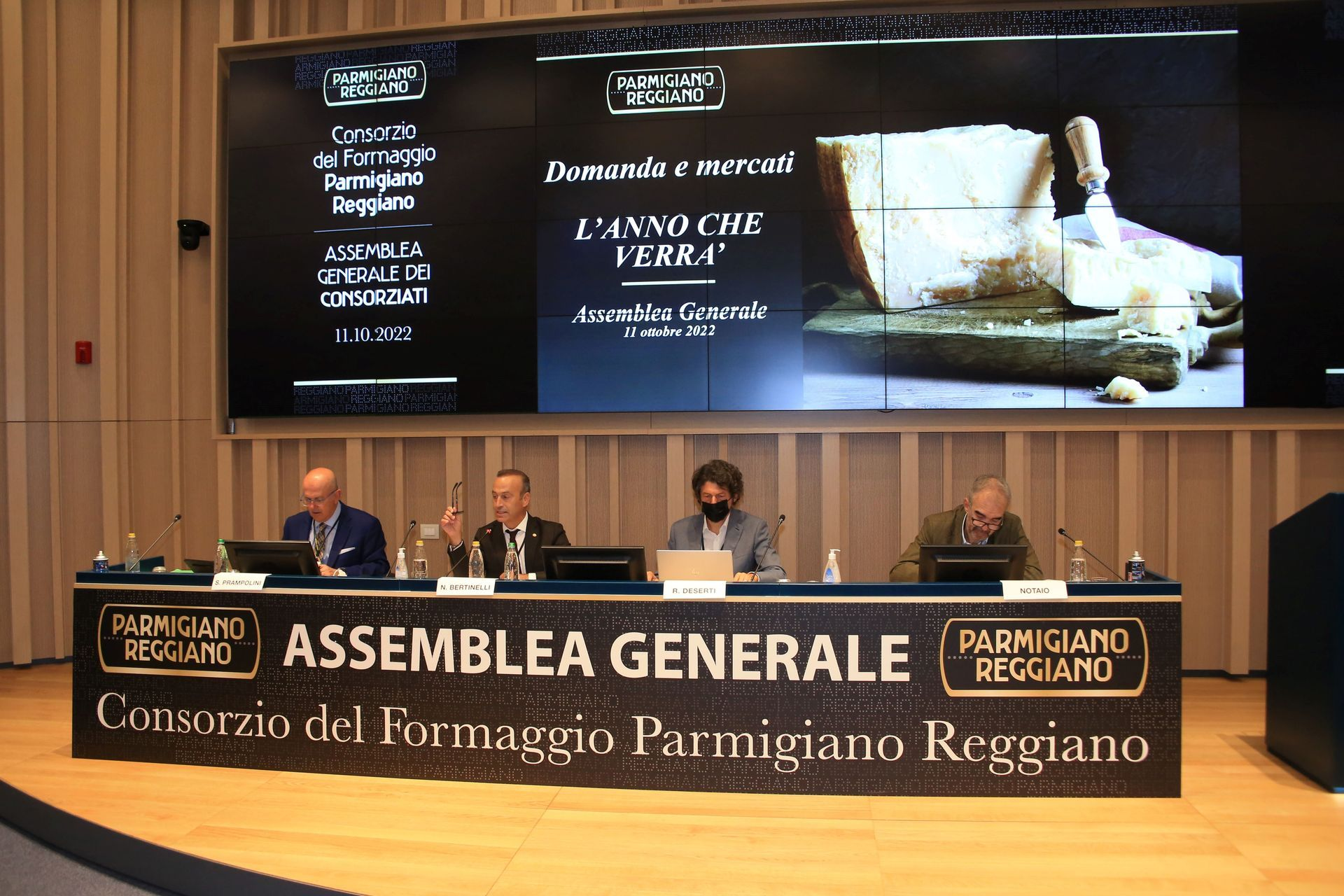
NEWS - 12 luglio 2021
Parmigiano Reggiano and Grana Padano, the two most important Italian PDOs in Italy and in the world, together against Nutriscore
Traffic light labelling systems are “devaluing practices”: the Consortia of Parmigiano Reggiano and Grana Padano will not authorize the labels of sector operators who will insert such information on the packaging of the two PDOs.
Reggio Emilia, 7 July 2021 - The Consortia of Parmigiano Reggiano Cheese and Grana Padano Cheese came together for the first time in a joint Board of Directors to say no to the Nutriscore system in compliance with one of the key tasks entrusted to them: “to adopt measures for the promotion of their products and, if necessary, to take action to prevent or counter measures which undermine or risk undermining the image of the products.” (Regulation no. 1151/2012 pursuant to Art. 45)
Nutrition labelling systems linked to the principle of traffic light scoring are spreading in Europe: a colour scale that ranges from green to red, associated with an alphabetical one (from the letter A to the letter E). Through an algorithm that takes into account calories, the amount of fats and sugars, each food is assigned a colour and a letter based on a standard amount of the product (i.e., 100g).
Tools based on these principles of classification mislead and deceive consumers. Real consumption of the products is related to absolute quantities that do not correspond to the amounts on which the algorithm is based. For example, the average quantity of cheese in a dish can vary from 20g to 40g, that of extra virgin olive oil from 10g to 20g, while for other products consumption may be higher than 100g (pasta, potatoes or fruit). In addition, these systems do not take into account the nutritional balance between different foods or the overall organoleptic characteristics of the product itself. Cheeses, in particular, are penalized for their fat content, neglecting the fact that cheeses provide many important nutrients: calcium, functional fatty acids, fat-soluble vitamins, and essential amino acids, all key elements for a healthy, well-balanced diet. As the Nutriscore system is based on generic and certainly not educational information to the consumer, we believe that it actually betrays the ultimate goal it had set itself, namely, to encourage healthy and balanced choices from a nutritional point of view. As for the PDO products in question, we believe that information to consumers about a healthy, balanced diet is extremely important. In order to really achieve this goal, the appropriate tools must be based on principles of nutrition education related to the overall diet and to information about recommended, realistic quantities of the individual products. Conversely, traffic light labels based on quantities that are disconnected from the overall diet and recommended portions are tools that mislead about the real nature of the individual product, as they are calculated on the basis of quantities that are very unlikely to be consumed in practice.
According to Nutriscore, Parmigiano Reggiano and Grana Padano would be classified as orange. But a dish of pasta consisting of 80g of pasta, 20g of extra virgin olive oil and 20g of PDO hard cheese would score - as a whole - green. For this reason,** labelling tools based on the traffic light principles are to be considered a practice that undermines PDO products because it discourages their consumption without any objective nutritional justification**. The goal should be to teach informed consumption of correct quantities, also taking into consideration the overall organoleptic characteristics of the product.
Therefore, except where there is a legal obligation,** in order to carry out the tasks conferred by Regulation 1151/2012, Art. 45, letter “f” the Consortium must take all actions deemed necessary to counter these practices**.
Therefore, the Board of Directors unanimously approved the following statement:
“Traffic light nutrition labelling systems based on quantities disconnected from diets and from recommended portions - except in cases involving mandatory national or European standards - are considered a measure that undermines the imagine of the PDOs Parmigiano Reggiano / Grana Padano pursuant to Regulation no. 1151/2012, Art. 45, letter “f”.
Therefore, in all cases where a player in the sector is asked, on a voluntary basis by the buyer, to change the labelling of the PDO product by inserting traffic light labelling or similar systems which do not take into account the actual quantities of Parmigiano Reggiano / Grana Padano consumed in practice and which do not provide any information about correct quantities in the context of a health and balanced diet, the Consortium can only reject the authorization request for such a label.
“We have taken action, together with the friends of Grana Padano, against a labelling system that makes no sense and undermines the image of Parmigiano Reggiano, which nutritionists have also considered a healthy and natural product. We are sure that this important initiative can be of help to the Government, which has already taken steps in this direction. It is an act of responsibility which in addition to protecting our product will benefit all the other quality agri-food products that would be unjustly penalized by a system without any objective nutritional justification,” stated Nicola Bertinelli, President of the Parmigiano Reggiano Consortium.
“For years now, their nutritional properties have made Grana Padano and Parmigiano Reggiano the best loved PDO products by consumers and the most imitated by unfair competitors - who are there therefore the first ones to benefit from this mechanism, points out Renato Zaghini, President of the Grana Padano Protection Consortium. Nutriscore denies the most reliable and up-to-date recommendations by nutritionists around the world, who stress the balance between quantity and quality of foods as the key element of a proper diet at all ages. On the strength of these scientific guidelines, we invite all producers of Italian agri-food products of excellence, starting with PDOs, to join forces to improve communication and, at the institutional level, to support Government initiatives against this labelling system, as poor nutrition information has an adverse impact not only on the producers investing in quality and sustainability, but also on the proper diet of consumers.”
In addition to Nutriscore, there are other important commitments on which the synergistic work of the two consortia is focussing, including the recent ruling in favour of the French Morbier PDO cheese, which represented an important step against evocations. “By copying our flavour, appearance, packaging and various names – assert Bertinelli and Zaghini - a great number of competitors are taking advantage of the confusion and of the consumer’s need to save. This is why we are making ourselves head at a political level to get watertight regulations approved: we need a clear separation on large retail shelves between PDO and non-PDO products, in addition to the obligation of showing their origin on the label and, as far as the restaurant sector is concerned, the obligation for menus to list the actual ingredients used in the kitchen. Our most powerful weapon is the awareness of the consumer, who must choose freely but also needs to know that, in order to be free, he/she must first of all be well-informed.”
NUTRITIONAL CONTRIBUTION OF GRANA PADANO PDO and OF PARMIGIANO REGGIANO PDO Within the context of a weekly diet, we can highlight, from a nutritional point of view, the example of the addition of 30-40g of Grana Padano PDO or of Parmigiano Reggiano PDO to a dish of spaghetti. The cheese supplies proteins, which are lacking in spaghetti, it provides raw milk microorganisms, with positive effects on the microbiome of individuals, it improves the tastiness of the food and in a controlled way it can replace salt in the cooking of pasta, thus better meeting the needs of the individual consumer.
Read also




